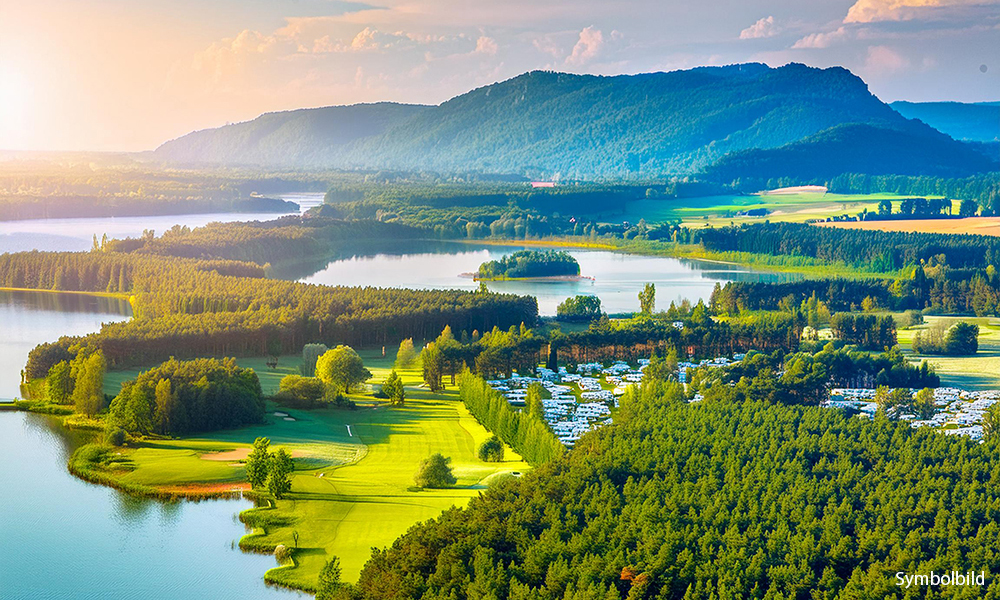The new joy of nomadic life.

Camping experienced its first major boom as a form of vacation in the 1950s. For people on a budget, these were tents that served as mobile homes. But caravans and camper vans in particular, such as the VW bus, became popular during this era. Parallel to this development, the first campsites were created in regions that were attractive to tourists. Most of them initially consisted of little more than demarcated meadows where you could pitch your tent or park your vehicle. But only if one did not prefer a spot in the great outdoors anyway. Since then, a real camping culture has been able to establish itself in European countries, especially in France and Italy. But also Brits, Germans and Dutch moved to warmer climes with their caravans for the holiday season.
Vacation in a deluxe tent
Almost 20 years ago, the concept of glamorous camping, known as clamping, was introduced. That gave the idea of camping a classy touch and attracted new fans. As it was once the case for colonial big game hunters on safari in their lodges, a large and fully equipped tent should offer every comfort. Today you can find glamping tents on many campsites as well as tastefully designed tiny houses. Both combine a comfortable holiday with a free life in nature, but without your own camping vehicle or tent. However, the accommodations on campsites are officially movables and not real estate, as they can be dismantled at any time.
The emancipation of camping as a form of vacation
Due to social media, the trend arose about 10 years ago for young and young-at-heart vacationers to build their own Sprinter class vehicles and travel through Europe. Semester holidays for students, parental leave for young families or sabbaticals were often used for this purpose. And the Corona years increased this development even further in order to escape the living space restricted by lockdowns. Today you meet people of all social classes and all ages at campsites. There are lovingly prepared vans from the 1960s next to luxury mobile homes worth well over a million euros; you can meet teenagers, young couples, families with children and senior citizens.
Strong substance, high opportunities for growth
Camping has arrived in the society. And it will stay, because it fulfills the need for a holiday close to nature as well as the opportunity to discover the world even with a lower income. The individual beauty and diversity of the host country can be experienced close and directly. In the last 20 years, the number of overnight stays on German campsites alone has almost doubled. Annual growth of 7.35% is expected worldwide until 2028. The market penetration rate of 3.7% is expected to increase by around 50% by then. Large tourism and hotel chains have long recognized the opportunities for themselves: in Austria, for example, the Falkensteiner Group is one of them. But also innovative start-ups, such as the Munich company Roadsurfer, founded in 2016, which currently rents out over 5,000 campers and motorhomes and works closely with campsite operators.
Location, property and management
These good prospects make campsites as an interesting investment. As with a classic hotel property, you invest in a combination of location, property and management. Due to its nature and culture, Austria is in great demand as a destination country among camping enthusiasts, as well as a transit country to Italy or the Adriatic region. At the same time, good places are rare. It's not just the local situation, the climate and the proximity to nature that counts, but also the range of special facilities and activities. The condition of the sanitary rooms and the infrastructure as a whole deserve particular attention. Anything that is outdated or in need of renovation has no chance in the medium term to survive with the very demanding guests. That's why it's always worth taking a look at current reviews in the internet, whether they're from organizations like the ADAC or through individual feedback from guests.
As innovative as the tourism industry: HOTELINVEST
After a long phase of skeptical observation of this exciting market segment in the tourism sector, HOTELINVEST has decided to include selected and critically examined campsite properties in its offering. Like the buy-to-let apartments, which are no longer allowed in Austria, these are ultimately hotel-like properties with great potential and all the advantages that hotels also offer. And as with hotels, in addition to an ongoing return from operations, an interesting increase in value should be possible for campsites in the medium term.
The current offer (as of April 2024) meets at least 6% p.a., thanks to its location and its facilities. It is suitable for institutional investors with their own, well-established operating concept as well as for private investors. For the latter, HOTELINVEST will be happy to find a suitable, professional operator as a tenant who will continue the previous success of the campsite.
